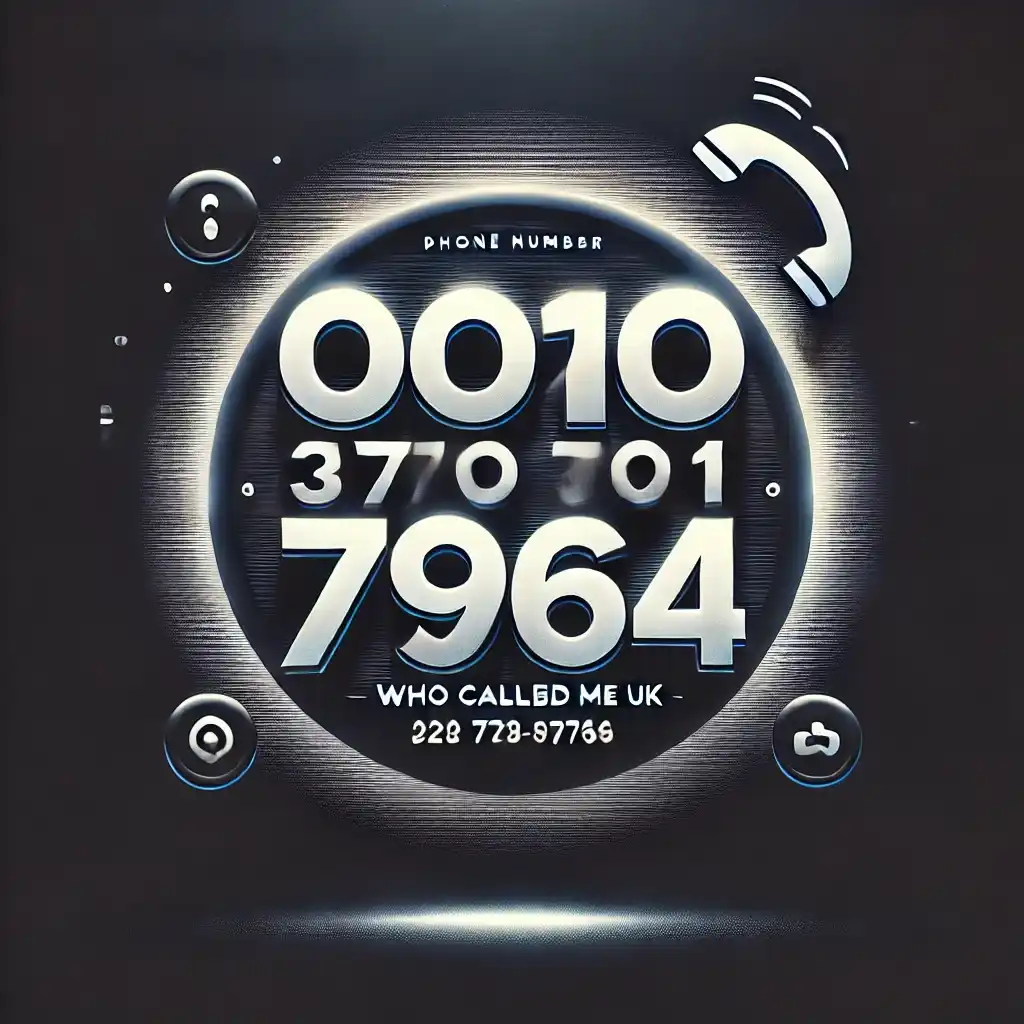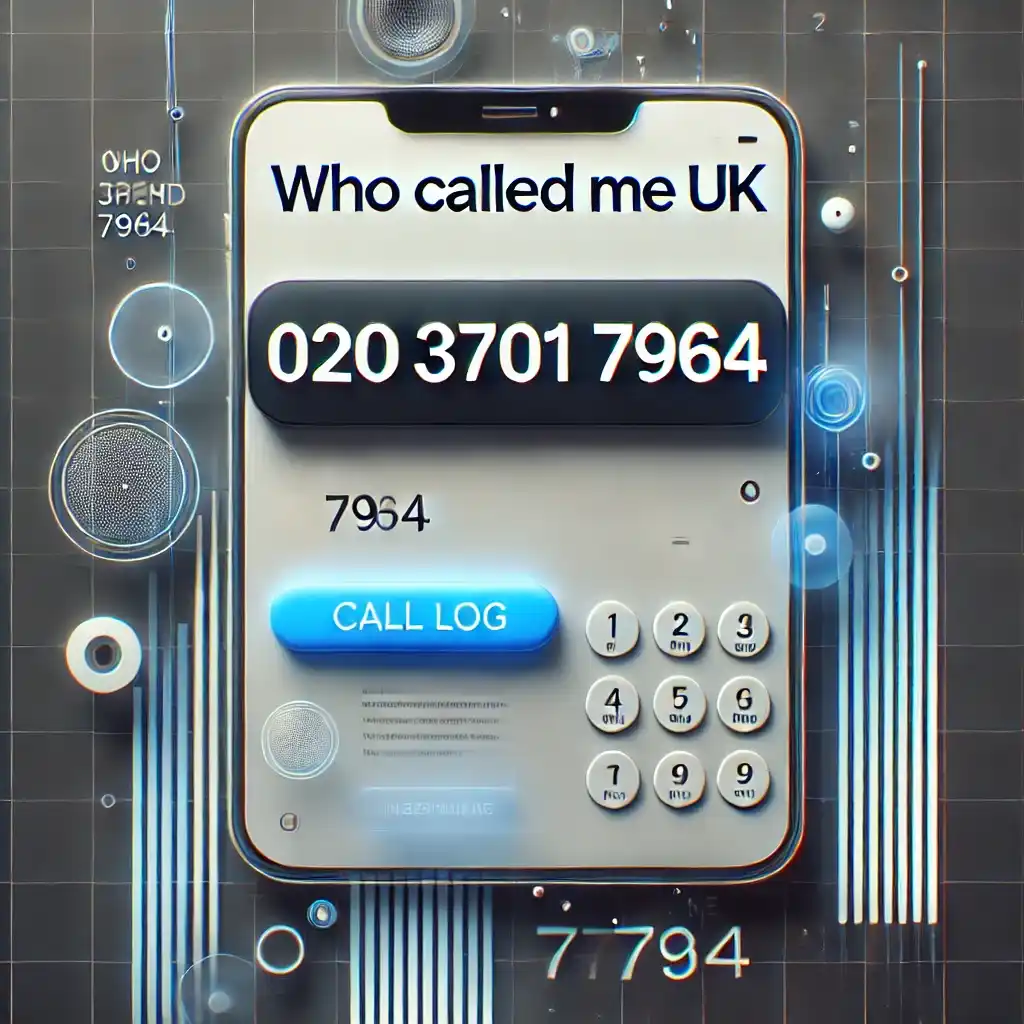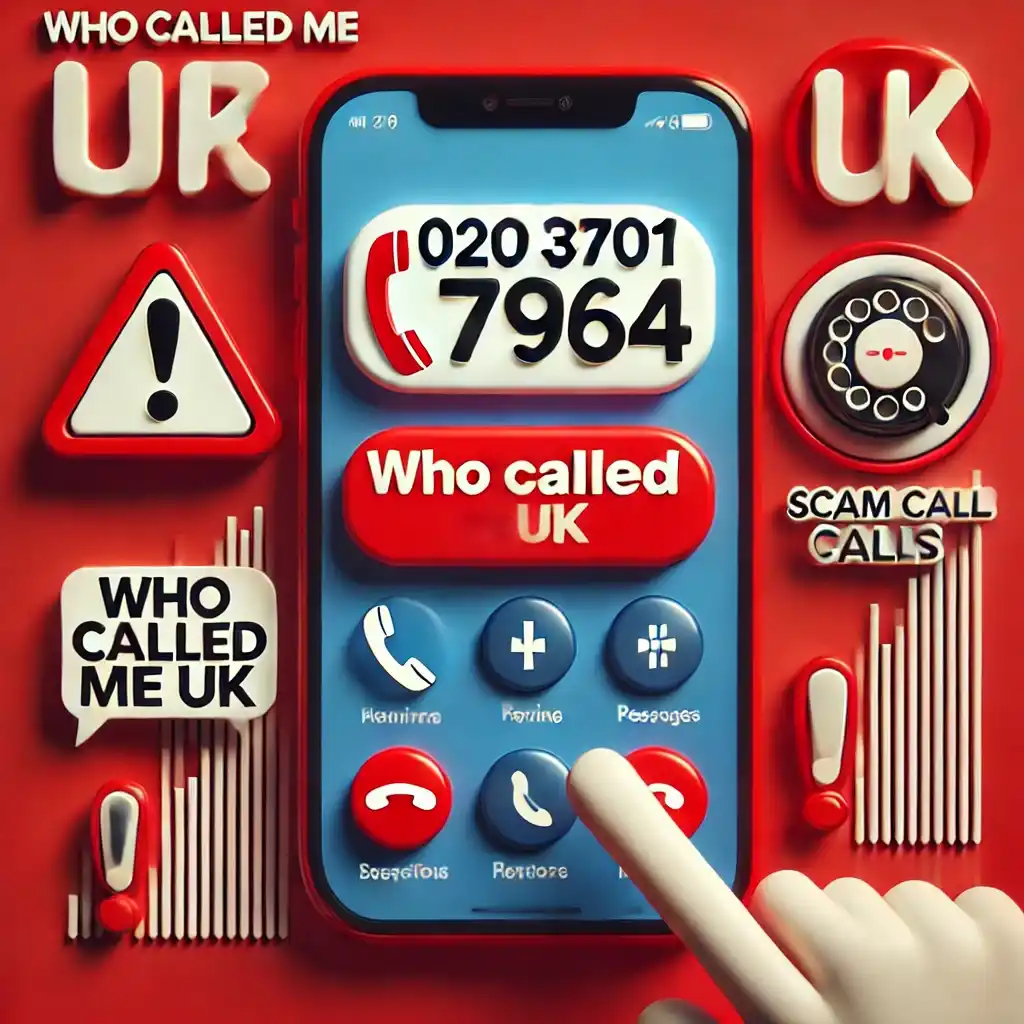A recent example involves the UK landline 02037017964—a number associated with the London area, flagged by community reports as having a neutral rating and connected to an insurance company. In today’s fast-paced digital world, receiving calls from unknown numbers can raise questions and concerns. One query that many UK residents have is: “Who called me UK?” Often, the answer is not immediately clear, particularly when the number in question appears linked to sectors such as insurance. This article will explore the various aspects of this query, provide insights into the specifics of the number, discuss the nature of insurance calls, and offer practical advice on how to verify and respond to such calls.
Understanding UK Landline 02037017964 Number
The Significance of the 020 Area Code
The United Kingdom uses a structured numbering system for both mobile and landline telephones. The “020” area code is synonymous with London, one of the world’s most dynamic and densely populated cities. This area code is widely recognized and used by businesses, government entities, and individuals alike. However, as the telecommunications landscape has evolved, even well-known prefixes can sometimes be associated with unexpected call origins—such as those from insurance companies.
Landlines in the Modern Era
Despite the prevalence of mobile phones, landlines remain an important communication tool, especially for businesses. In many cases, companies prefer using landlines for customer service, detailed discussions, or initial outreach, as these lines offer a degree of stability and trust. Yet, when receiving a call from an unfamiliar number, even a landline can cause hesitation. Therefore, understanding the background of a number can be crucial in determining whether to answer or ignore the call.
Dissecting the Number: 02037017964

What the Numbers Tell Us
For individuals wondering, “Who called me UK?” and seeing the number 02037017964, several key points emerge:
- Location: The “020” prefix indicates the call originates from London.
- Type: As a landline, it often suggests a stable connection typically used by established organizations.
- Reports and Lookups: Community feedback reveals one report and 359 lookups, with the caller rated as neutral. While the number has garnered some attention, the neutral rating suggests that experiences with this caller vary, with no significant evidence of malicious intent.
Community Insights
User reports and lookups are invaluable tools in verifying the credibility of unknown callers. In the case of 02037017964, community members have mentioned keywords like “Insurance” and “Company.” This implies that the call might be linked to an insurance-related inquiry or offer. However, with only one report against 359 lookups, the general sentiment is neutral—neither overtly positive nor definitively negative. For individuals receiving a call from this number, such data provides an initial baseline of information to consider before deciding to engage. Read previous blog post Who Called me 0800 497 0623.
Insurance Calls: Legitimacy and Considerations
The Prevalence of Insurance-Related Calls
Insurance companies frequently use telephone outreach to provide quotes, discuss policies, or follow up on inquiries. Such calls are an integral part of the industry’s marketing and customer service strategies. However, the volume of these calls and the mixed experiences reported by users can sometimes cast a shadow of doubt on their legitimacy.
Differentiating Between Legitimate and Suspicious Calls
While many insurance calls are entirely legitimate, certain red flags can signal caution:
- Unexpected Contact: If you have not recently inquired about insurance, an unsolicited call—even from a London-based landline—should prompt further scrutiny.
- Verification: A reputable insurance company will typically provide verifiable contact information and encourage you to confirm details via official websites or customer service lines.
- Pressure Tactics: Any call that pushes for immediate decisions or personal information should be treated with skepticism.
User Experiences and Community Reports
The community data associated with the number 020 3701 7964 reflects mixed experiences. While some users may have found the call helpful or routine, others might be uncertain about its authenticity. This neutrality in user sentiment underscores the importance of independent verification before taking any action based solely on the call.
How to Verify a Caller’s Legitimacy
Step 1: Conduct a Reverse Phone Lookup
A reverse phone lookup is one of the most effective ways to ascertain the identity of an unknown caller. Many online directories and dedicated websites provide detailed reports on numbers like 020 3701 7964. Look for information that confirms the company’s name, address, and industry to ensure the call aligns with your expectations.
Step 2: Check Official Websites
Before engaging with an insurance call, visit the official website of the purported company. Genuine businesses will have an online presence complete with verified contact details, customer reviews, and regulatory information. Cross-referencing the caller’s details with information on the company’s website can help confirm legitimacy.
Step 3: Ask for Identification During the Call
If you answer an unexpected call, request the caller’s name, the company they represent, and a callback number. Legitimate organizations are usually transparent about their identity and will not hesitate to provide such information. Once you have these details, verify them independently using online resources or customer service lines listed on the company’s official website.
Step 4: Utilize Community Feedback
Community-based platforms and review sites often offer insights from other users who have had interactions with the caller in question. The data indicating one report and 359 lookups for 020 3701 7964 suggests that many individuals have encountered the number, but the overall neutral rating implies caution rather than alarm. Use these insights as part of a broader verification process.
Phone Number Lookup Resources
Online Directories and Lookup Services
Several reputable websites specialize in reverse phone lookups, offering comprehensive details about the caller’s history and reputation. These resources typically provide:
- User Ratings: Aggregate ratings based on community feedback.
- Call Frequency: Data on how many times the number has been looked up or reported.
- Additional Information: Industry classification, associated businesses, and any reported scam alerts.
Benefits of Using Lookup Services
By using these services, you can quickly gain an overview of any unfamiliar number. This proactive approach not only helps in determining if the call is likely to be legitimate but also in protecting yourself from potential scams. Whether you are based in the UK or the USA, these lookup tools can be an essential part of your digital safety toolkit.
Recommended Resources
For those interested in further research, consider these steps:
- Visit trusted websites that offer reverse phone lookup services.
- Read user reviews and community reports.
- Compare data from multiple sources to ensure consistency in the information provided.
The Role of Caller ID and Modern Telecommunication
Advances in Caller ID Technology
The evolution of caller ID technology has been a boon for many consumers. Modern systems now provide more detailed information about the origin of calls, including geographic location and potential company affiliation. For example, the identification of 020 3701 7964 as a London-based number can now be more reliably tied to its local origin through enhanced data aggregation.
Limitations and Challenges
Despite these advances, caller ID information can sometimes be spoofed or manipulated. Scammers may use legitimate-looking numbers to disguise their identity, making it even more important for individuals to verify calls independently. This is particularly relevant in sectors like insurance, where high call volumes can lead to both legitimate outreach and fraudulent activity.
The Future of Telecommunication Security
As we move further into 2025, the telecommunications industry continues to innovate. Enhanced verification protocols, blockchain-based identity verification, and improved regulatory frameworks are expected to reduce the incidence of fraudulent calls. However, until these measures become ubiquitous, consumer vigilance remains paramount.
Best Practices When Receiving Unsolicited Calls
Maintain a Healthy Skepticism
When faced with the question “Who called me UK?” it’s important to approach each unexpected call with a degree of skepticism. While not every call is a scam, it is wise to be cautious and confirm the legitimacy of any unexpected outreach.
Do Not Share Personal Information
Never provide sensitive information such as your bank details, full name, or address during an unsolicited call. Legitimate companies will never ask for critical personal details over the phone without prior verification.
Use Call Blocking and Filtering Tools
Modern smartphones and landline services often include features to block or filter calls from numbers that are frequently reported as suspicious. Incorporating these tools into your daily communication strategy can help reduce unwanted calls and enhance your overall safety.
Document the Call
If you receive a call from an unfamiliar number, note the time, date, and any details shared by the caller. This documentation can be useful if you need to report the call to your service provider or a regulatory body.
Navigating the Insurance Call Landscape
Why Insurance Companies Call
Insurance companies rely on direct communication to offer competitive quotes, follow up on claims, or remind customers about policy renewals. However, the legitimacy of these calls should not be taken for granted. While some insurance calls are part of regular business practice, others might be linked to aggressive marketing tactics that can seem intrusive.
How to Evaluate the Call’s Purpose
When you receive a call from an insurance company, especially from a number like 020 3701 7964, consider the following:
- Relevance: Have you recently expressed interest in insurance or requested a quote? If not, the call might be unsolicited.
- Transparency: Legitimate companies provide clear identification and detailed information about their services.
- Verification: Ask for additional information, such as a company website or reference number, which can help you cross-check the legitimacy of the call.
Consumer Rights and Regulations
In the UK, consumer protection laws are in place to safeguard individuals from misleading marketing practices. Regulatory bodies, such as Ofcom, oversee telecommunications and can intervene if there is evidence of persistent fraudulent activity. It is advisable to familiarize yourself with these regulations, ensuring that you know your rights when interacting with unfamiliar callers.
Table of Key Aspects
To enhance the readability of the article, below is a table summarizing the key aspects of the discussed topics:
| Aspect | Detail | Implication |
|---|---|---|
| Phone Number | 020 3701 7964 | UK-based landline from the London area |
| User Reports | 1 report and 359 lookups | Neutral rating; mixed user experiences |
| Associated Keywords | Insurance, Company | Likely linked to an insurance call |
| Caller Type | Business/Insurance Outreach | Could be legitimate or a marketing call; verify before engagement |
| Verification Steps | Reverse lookup, official website check, caller identification | Essential for ensuring the call is genuine |
| Telecommunication Trends | Advancements in caller ID, security protocols | Enhanced safety but requires vigilance due to spoofing risks |
| Consumer Rights | Protected under UK regulations, Ofcom oversight | Ensures recourse in cases of misleading or fraudulent calls |
International Perspectives: UK and USA Comparisons
The UK Approach
In the UK, there is a strong emphasis on consumer rights and regulatory oversight. When individuals ask, “Who called me UK?”, they benefit from systems designed to track and report suspicious calls. The regulatory framework, backed by organizations like Ofcom, ensures that companies must adhere to strict guidelines when making unsolicited calls. Moreover, community feedback on platforms that track caller details provides an additional layer of assurance for users.
The USA Perspective
Across the Atlantic in the USA, similar concerns about unknown callers are prevalent. However, the regulatory environment is somewhat different, with agencies like the Federal Communications Commission (FCC) playing a major role. Although the focus in the USA is on combating robocalls and scam calls, the fundamental best practices—such as verifying caller identity and avoiding the sharing of personal information—remain universal. Businesses in both countries are increasingly leveraging technology to improve caller verification processes and reduce the risk of fraud.
Shared Best Practices
Regardless of geography, the principles of caution, verification, and consumer protection are shared between the UK and the USA. Both regions emphasize:
- Transparency in Caller Identification: Ensuring that companies provide verifiable details.
- Consumer Empowerment: Encouraging users to conduct their own research via lookup services.
- Technological Advancements: Using modern caller ID and spam filtering tools to minimize risk.
How the Digital Age Has Transformed Caller Identification

From Landlines to Smart Communication
The transition from traditional landlines to modern communication platforms has revolutionized the way we identify and respond to calls. In 2025, many households and businesses are equipped with smart devices that integrate caller ID with real-time verification systems. These tools not only display the caller’s number but also aggregate data from various sources, including community reports and official directories.
Artificial Intelligence and Data Analytics
Artificial intelligence plays an increasingly significant role in identifying patterns of fraudulent calls. AI-powered systems analyze call data, flagging numbers that show signs of suspicious behavior. This evolution means that when you receive a call from a number like 020 3701 7964, there is a higher chance that you’ll have immediate, data-driven insights into the call’s legitimacy. Consumers are empowered with instant access to information that previously required multiple lookup steps.
The Future of Caller Authentication
Looking ahead, further innovations are anticipated. Biometrics, blockchain-based identity verification, and enhanced regulatory frameworks are poised to make it even more challenging for fraudulent calls to slip through undetected. In this rapidly evolving landscape, continuous consumer education remains critical—ensuring that you can confidently address questions like “Who called me UK?” with assurance.
Practical Tips for Handling Unsolicited Insurance Calls
Stay Informed
Knowledge is your best defense. Regularly update yourself on the latest trends in phone scams and insurance call practices. Many reputable websites and governmental agencies publish up-to-date guidance on identifying and avoiding fraudulent calls.
Trust Verified Sources
When in doubt, rely on official sources. Whether it’s a reverse phone lookup tool or an official website of the insurance company, verified information will always serve as a reliable benchmark. Do not hesitate to contact customer support using numbers found on verified websites to confirm the legitimacy of the call.
Protect Your Privacy
Your personal information is valuable. Always exercise caution when receiving unsolicited calls, and avoid sharing sensitive data unless you are completely certain of the caller’s identity. This not only protects you from potential scams but also minimizes the risk of identity theft.
Utilize Technology
Leverage modern technology to filter out unwanted calls. Many smartphones now come with built-in call blocking features, and third-party apps can further assist in identifying and blocking spam calls. By staying ahead technologically, you can better manage your communications and reduce the likelihood of interacting with fraudulent callers.
Conclusion
The question “Who called me UK?” can evoke a range of responses, particularly when the call originates from a number like 02037017964—an apparently neutral-rated London-based landline linked to insurance inquiries. As explored in this article, understanding the background of UK numbers, the nature of insurance calls, and the methods available for verifying a caller’s legitimacy is essential in today’s interconnected world.
From using reverse phone lookups and checking official websites to leveraging advanced caller ID technologies and AI-driven analytics, consumers now have access to an unprecedented level of information. Whether you’re based in the UK or the USA, staying informed and exercising caution can help ensure that you confidently manage your communications and protect your personal information.
In 2025, as technological advances continue to reshape the telecommunications landscape, the fundamental principles of verification, transparency, and consumer empowerment remain as important as ever. By adopting best practices and utilizing modern tools, you can not only answer the query “Who called me UK?” with clarity but also maintain your security and peace of mind in an era of rapid digital transformation.

